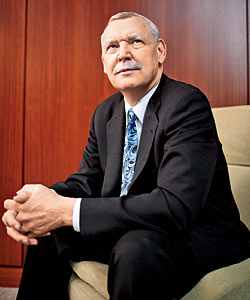Interview conducted and condensed by Jeff Bailey

Let’s call this an intervention: You built Mesirow into a brokerage firm with about $30 billion of investors’ money under management, and you managed to sidestep the worst of the recent economic chaos. But then you seemingly defied all logic by leading a group that bought the Sun-Times and other local newspapers out of bankruptcy last fall. Investment or civic gesture?
Clearly an investment to make money. But a risky investment. We put in enough money to continue to make very significant capital expenditures.
How much?
I’m not saying.
OK. I know the Sun-Times is expanding online offerings, altering labor arrangements to cut costs, and trying to hang on to readers and advertisers. Everyone is trying that. But have you heard any good ideas for saving newspapers lately?
I’ll say bankruptcy is a very beautiful thing. You can make changes that would take years otherwise. The Sun-Times will be high integrity. Local. We’ll build on the great sports position we have. Why don’t we have merchandise? A partnership with ESPN? We can partner with the great tech firms. They need content. We’ll create hundreds of partnerships.
Your day job at Mesirow has involved making more than 50 acquisitions. Any disasters?
Seventy-five percent of the acquisitions worked out well. Some of those took a while. And 25 percent just went away. We believe in taking risks that can cause us cuts and bruises but never serious injury.
Is that because Mesirow is employee owned, including your 15-percent stake, meaning it’s not other people’s money, as it was at Wall Street firms that nearly brought the economy down?
Yes. We’re diversified, so we never have an all-good year, but never have an all-bad year. That means we settle for 15-percent returns, not 40 percent. But we’re still around.
All this business stuff seems insignificant next to your personal story: a quarter century suffering with diabetes and then a transplant three years ago of two kidneys and a pancreas.
It’s a miracle. After I got a transplant, I went around cursing all my friends: “You son of a gun, you never told me what it feels like to feel great.” As a diabetic, you fight through every day. I got new parts and pieces from a younger person. On average, I ought to be about 35 years old right now! The diabetes is gone.
The other thing that sets you apart from fellow CEOs is that you didn’t attend a prestigious university—no offense to Illinois State. And you grew up working class, a child of divorce, on the edge of a prosperous South Side neighborhood—Beverly—where conservative Catholicism dominated. Is that what motivated you to become Mesirow’s president at age 32?
In the beginning, I competed against guys from Harvard and Stanford, and I had a chip on my shoulder. I had to work harder. It cuts both ways. Growing up, I knew kids whose parents wouldn’t let them play with me—the broken-family syndrome. But I was president of the eighth-grade class. I never understand why powerful people are arrogant. It pisses me off.
And then there’s the mustache.
I’ve had it since the day I got out of high school, 1975. My wife and kids hate it. I don’t think it’s particularly flattering. But it’s like a 35-year friend to me.
Photograph: Tom Mayday



